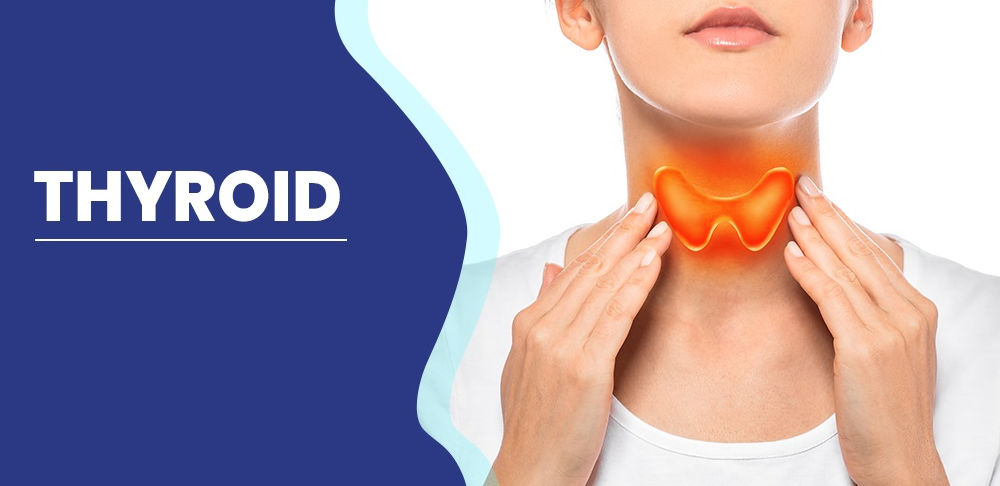
Nestled in the front of your neck, shaped like a butterfly, lies the unassuming thyroid gland. Despite its small size, its influence is mighty. The thyroid produces hormones that regulate your metabolism, affecting everything from your energy levels and mood to your weight and heart rate.
But what happens when this tiny powerhouse malfunctions? Let’s delve into the world of the thyroid, exploring its functions, common problems, and how to keep it happy and healthy.
The Mighty Thyroid:
- Hormonal Maestro: The thyroid produces two main hormones: T3 and T4. These hormones act like keys, unlocking processes that keep your body running smoothly. They influence your metabolism, heart rate, digestion, mood, temperature, and more.
- Fueling the Body: The thyroid controls how your body uses energy. When it functions properly, you have ample energy to tackle your day. But imbalances can leave you feeling sluggish or experiencing unexplained weight changes.
- Beyond the Physical: Thyroid hormones even play a role in brain development, fertility, and mental well-being.
When Things Go South:
Unfortunately, the thyroid is susceptible to various issues:
- Hyperthyroidism: When the thyroid is in overdrive, producing too much hormone, you may experience anxiety, rapid heartbeat, weight loss, and sleep problems.
- Hypothyroidism: On the flip side, an underactive thyroid, producing too little hormone, can lead to fatigue, weight gain, sensitivity to cold, and depression.
- Other Concerns: Goiter (enlarged gland), nodules (lumps), and thyroiditis (inflammation) are other thyroid-related issues with varying symptoms and impacts.
Keeping Your Thyroid Happy:
Fortunately, there are ways to support your thyroid health:
- Nutrition: Iodine is crucial for thyroid hormone production. Include iodized salt and seafood in your diet. Consult your doctor before taking iodine supplements.
- Stress Management: Chronic stress can disrupt thyroid function. Practice relaxation techniques like yoga or meditation.
- Regular Checkups: Schedule regular checkups with your doctor for thyroid screening, especially if you experience concerning symptoms.
- Healthy Lifestyle: Maintaining a healthy weight, getting enough sleep, and exercising regularly can contribute to overall thyroid health.
Remember: This blog is for informational purposes only and is not a substitute for professional medical advice. If you have any concerns about your thyroid health, consult your doctor for diagnosis and treatment.
Stay tuned for future posts where we’ll delve deeper into specific thyroid conditions, management strategies, and inspiring stories of individuals navigating the world of thyroid health!
Treating Thyroid Conditions:
- Most thyroid conditions aren’t “curable” in the sense that you permanently eliminate the underlying cause. This is especially true for autoimmune conditions like Hashimoto’s thyroiditis, the leading cause of hypothyroidism.
- However, effective treatments can control the symptoms and restore normal thyroid function, allowing you to live a normal life. These treatments depend on the specific condition and severity. Here are some common approaches:
- Hypothyroidism: The standard treatment is thyroid hormone replacement medication, which you’ll likely need to take for life.
- Hyperthyroidism: Options include anti-thyroid medications, radioactive iodine treatments, or surgery. However, these treatments often address the overproduction of hormones, not necessarily the underlying cause.
- Thyroid cancer: Depending on the type and stage, treatment may involve surgery, radioactive iodine, chemotherapy, or radiation therapy. In some cases, this can lead to a “cure” or long-term remission.

Specific Yoga Practices:
- Gentle Inversions: Supported shoulderstand (Sarvangasana), Plow pose (Halasana), and Legs-up-the-wall pose (Viparita Karani) are believed to stimulate the thyroid gland, but only attempt these under the guidance of a qualified yoga instructor if you have no contraindications.
- Neck Stretches and Cat-Cow Pose: Gentle neck stretches and fluid movements in Cat-Cow pose can help maintain flexibility and mobility in the neck area where the thyroid gland is located.
- Pranayama: Breathing exercises like Kapalbhati and Anulom Vilom can promote energy and focus, but consult your doctor before practicing these if you have hyperthyroidism.
- Restorative Yoga: Poses like Child’s Pose (Balasana) and Supported Savasana (Corpse Pose) can promote relaxation and reduce stress, potentially benefiting thyroid health indirectly.
Additional Points:
- It’s crucial to discuss your specific situation with your doctor. They can recommend the most suitable treatment based on your diagnosis, individual needs, and medical history.
- Be wary of unsubstantiated claims about “cures” for thyroid conditions. These can be misleading and potentially harmful.
- Focus on reliable sources of information, such as reputable medical organizations and government websites.
- Remember, managing your thyroid condition effectively involves not just treatment but also healthy lifestyle choices and regular follow-up with your doctor.
Here are some helpful resources for further information:
- American Thyroid Association: https://www.thyroid.org/
- National Institutes of Health: https://www.niddk.nih.gov/
- Mayo Clinic: https://www.mayoclinichealthsystem.org/hometown-health/speaking-of-health/thyroid-disease-symptoms-and-treatment
I hope this information clarifies the concept of “cure” in the context of thyroid conditions and helps you find reliable sources for further exploration.
